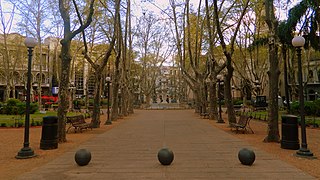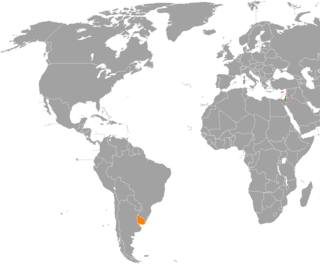
This article deals with the diplomatic affairs, foreign policy and international relations of Uruguay. At the political level, these matters are officially handled by the Ministry of Foreign Relations, also known as Cancillería, which answers to the President.

José Luis Gabriel Terra Leivas was a lawyer and politician of Batllista origin in Uruguay, and advisor to all Uruguayan governments on diplomatic, Economic and financial issues between 1900 and 1938.

Lesbian, gay, bisexual and transgender (LGBT) rights in Uruguay rank among the highest in the world. Same-sex sexual activity has been legal with an equal age of consent since 1934. Anti-discrimination laws protecting LGBT people have been in place since 2004. Civil unions for same-sex couples have been allowed since 2008 and same-sex marriages since 2013, in accordance with the nation's same-sex marriage law passed in early 2013. Additionally, same-sex couples have been allowed to jointly adopt since 2009 and gays, lesbians and bisexuals are allowed to serve openly in the military.

Banco de la República Oriental del Uruguay is a state-owned national and commercial bank in Uruguay, founded in 1896 under the presidency of Juan Idiarte Borda.

Plaza de la Constitución, also known as Plaza Matriz, is the oldest city square in Montevideo, Uruguay.

Plaza Independencia is the most important city square in Montevideo, Uruguay, laid out in the 19th century in the area occupied by the Citadel of Montevideo. In its center is a monument to General José Gervasio Artigas, and below it, his mausoleum.
Prostitution in Uruguay was legislated in 2002 through the sex work law (17.515). Before that, prostitution was unlegislated but it was not illegal, since the constitution allows any activity that is not forbidden by law. Prostitution is currently not a subject of debate.

Israel–Uruguay relations are foreign relations between Israel and Uruguay. Uruguay was the first South American country and the fourth in the world to recognize Israel.

The Ministry of the Interior (MIR) is a department of the Government of Spain responsible for public security, the protection of the constitutional rights, the command of the law enforcement agencies, national security, immigration affairs, prisons, civil defense and road traffic safety. Through the Undersecretariat of the Interior and its superior body, the Directorate-General for Internal Policy, the Ministry is responsible for all actions related to ensuring political pluralism and the proper functioning of electoral processes.
The 1973 Uruguayan coup d'état took place in Uruguay on 27 June 1973 and marked the beginning of the civic-military dictatorship which lasted until 1985.

Ana Carolina Cosse Garrido is a Uruguayan engineer and politician who has been Intendant of Montevideo since November 27, 2020. A member of the Broad Front, she served as Minister of Industry, Energy, and Mining from 2015 to 2019 during the second administration of President Tabaré Vázquez. In the 2019 Uruguayan general election, she was elected to the Senate of Uruguay, taking her seat on February 15, 2020. On September 27, 2020, she was elected Intendant of Montevideo, the capital of the country. She is seen as a possible presidential candidate for 2024.
Mujer y Salud en Uruguay is a feminist non-governmental organisation founded in Uruguay 1996. Its mission is the "promotion and protection of sexual and reproductive health and rights (SRHR) from a gender and generations' perspective". The headquarters are in Montevideo, where an interdisciplinary team works alongside a national and regional network of professionals and investigators. The current chairwoman is Lilián Abracinskas.

The Ministry of Livestock, Agriculture, and Fisheries of Uruguay is the ministry of the Government of Uruguay responsible for proposing and carrying out the government policy on agricultural, livestock and fishery resources. The ministry is also responsible for the permanent development of the agricultural, agroindustrial and fisheries sectors, promoting their insertion in both regional and extra-regional external markets, based on the management and sustainable use of natural resources.
The Ministry of Transport and Public Works of Uruguay is a ministry of the Government of Uruguay that is responsible for the development and planning of public infrastructure works in order to promote national development of Uruguay.
The Ministry of Tourism of Uruguay (MINTUR) is a ministry of the Government of Uruguay that is responsible for guiding, stimulating, promoting, regulating, researching and controlling tourism and activities and services directly related to it. It is also responsible for generating the conditions for Tourism to be accessible, planning the development of training and training in this economic activity, and promoting the development of infrastructure and accessibility conditions. This department of government promotes in the tourist activity the approaches of gender, ethnic-racial, sexual diversity, disability.
The Office of Planning and Budget (OPP) is a dependency of the Presidency of Uruguay that is responsible for advising the Executive Power in the formulation of national and departmental plans, programs and policies as well as in the definition of the Government's economic and social strategy. It is headquartered in the Executive Tower, Montevideo. The Director of the Office of Planning and Budget is appointed by the President of the Republic at the beginning of the mandate. The position has the same requirements as that of Cabinet Minister and, in practice, has a similar hierarchy. He usually participates in the meetings of the Council of Ministers. The current head is Isaac Alfie, who has held the position since March 1, 2020.

Julio Daniel Salinas Grecco is a Uruguayan neurologist and politician of Open Cabildo (CA), who served as Minister of Public Health of Uruguay from 1 March 2020 to 13 March 2023.

The presidency of Luis Lacalle Pou began on 1 March 2020 when he was inaugurated as the 42nd president of Uruguay. Lacalle Pou, a member of the National Party took office following his victory over the Broad Front nominee Daniel Martínez in the second round of the 2019 general election, which ended the 15-year leftist rule in the country and the return of National Party to the Executive since his father was the president in 1990–1995. On 16 December 2019, after his victory in the second round and before his inauguration, he announced his cabinet consisting of leaders of National, Colorado, Cabildo Abierto and Independent parties, members of the Multicolor Coalition.
Ana Evelyn Karina Rando Huluk, better known as Karina Rando, is a Uruguayan anesthesiologist and politician of Open Cabildo (CA).

The presidency of José Mujica began on 1 March 2010 when he was inaugurated as the 40th constitutional president of Uruguay. Mujica, a member of Broad Front's Movement of Popular Participation, took office following his victory over the National Party's nominee Luis Alberto Lacalle in the second round of the 2009 Uruguayan general election, thus continuing another five years of leftist government.













